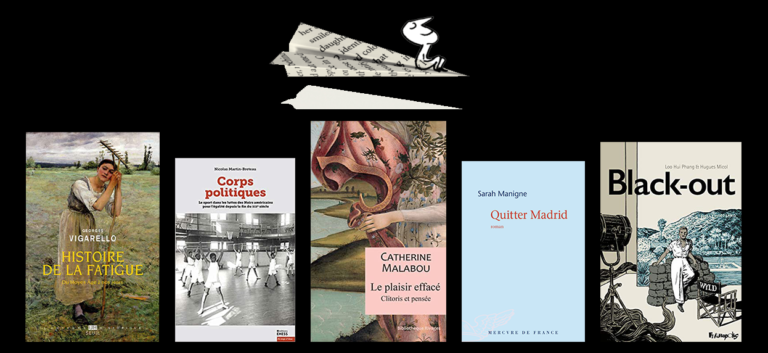
French Voices Awards 2021-1 Announced
Books & Ideas

Serge Bloch
The French Voices Committee and the Book Department at the Cultural Services of the French Embassy are pleased to announce the 2021 French Voices Awards (Spring Session)
This year’s first selection includes a novel that examines the intersection of heteronormativity, religion, gender, and family; a unique work of poetry on the end of life; a short stories collection that explores the complex world beyond Paris; and two essays: one that looks back on the legacy of African Americans in print and another that emphasizes one of today’s greatest challenges—climate change.
Established in 2006 by the French Embassy and FACE Foundation, these awards seek to recognize and support translators and publishers of exceptional works. This year’s winners join an outstanding group of authors published in the collection.
We want to express our heartfelt congratulations to all of the winners!
The Grand Prizes will be announced after the close of the second session.
The winners are as follows:
La Petite Dernière by Fatima Daas (Les Éditions Noir sur blanc/Other Press, translated by Lara Vergnaud)
“My name is Fatima Daas.” So begins each chapter of Fatima Daas’ debut novel, La Petite Dernière. Through an eponymous character, the author recounts the struggles of a young woman’s attempt to reconcile her homosexuality with her religion. The youngest daughter of Algerian-Muslim parents, “Fatima Daas” is seen as “different” and repeatedly encounters forms of bias for her physical features, her family origins, and her sexuality. Refusing to live up to the family’s “baby girl,” status, she rejects the feminine norms expected of her at the expense of her relationship with her parents. Written in succinct and direct prose, Daas’ novel challenges preconceptions of what it means to be Muslim, North African, female, and lesbian.
Toute minute est premiere by Marie-Claire Bancquart (Le Castor Astral/seeking an American publisher, translated by Jody Gladding)
Marie-Claire Bancquart, Toute minute est premiere, was published after her death in February 2019, containing her final work as well as twenty unpublished poems from 2018. The text considers life in the face of death: how to progress through the culminating moments of life with an acute understanding that the days are numbered. Bancquart’s poems show an acute awareness of death while also a unique view of the beauty and freedom that life provides. Moreover, her poetic style accentuates the weighty implications of its written product. In an article for Le Monde, Patrick Kéchichian praised the singularity of Bancquart’s work, characterizing it as “full, dense, unexpected, often grating, fleeing verbal coquetry, pushing back against elegiac or even lyrical developments.” These attributes echo the very posture to be taken when approaching death: to be intentional unflinching while alive to appreciate and experience the real gifts life has to offer.
Please note that we are eagerly seeking a U.S. publisher for this title. For questions regarding the book, please email us so that we can share more information and a sample translation. For other titles seeking an American publisher, please go to the following page.
Banlieues Parisiennes Noir by Hervé Delouche (Asphalte Éditions/Akashic Books, publication February 2022, translated by Katie Assef, Nicole & David Ball, and Paul Curtis Daw)
Composed of thirteen unpublished short stories, Banlieues Parisiennes Noir features several places on the outskirts of Paris. From the Fountainebleau forest and Neuilly-sur-Seine to the prison of Fleury-Mérogis, this newest installment of “Asphalte Noir” brings readers to the surrounding regions of Paris that stand out from the famous mystique and allure of the capital city. The work includes Guillaume Balsamo’s “Fin des travaux prévue : février 2027,” which, using humor, adds nuance to its morose subjects of drugs and murder. The dark side of politics is elucidated in “On a des yeux pour croire” by Insa Sané. Also, distinguished for its emphasis on contemporary urban issues such as gentrification is Anne Secret’s “Les Ombres du Trapèze.” The formidable story line up of Banlieues Parisiennes Noir explores the complex world just beyond the borders of one of the world’s most famous cities.
Textes fugitifs. Le récit d’esclave au prisme de l’histoire du livre by Michaël Roy (ENS Éditions/University of Wisconsin Press, translated by Susan Pickford)
Bridging the gap between African American studies and book history, “Textes fugitifs” examines the publication, circulation, and reception of antebellum slave narratives. Aided by newly rediscovered archives in the United States and elsewhere, this book reconstructs the ways in which former slaves such as Frederick Douglass, William Wells Brown, Harriet Jacobs, and Sojourner Truth accessed print materials in a world hostile to the publication and proliferation of abolitionist—let alone Black-authored—literature. Roy’s work presents a wealth of information and evidence that sheds light on the industry of slave narrative publication. He demonstrates that this economy was diverse and consisted of Black printing practices, more than just those of northern white abolitionists, who are typically attributed to have dominated the sector. In doing so, Roy brings forth new knowledge of the slave narrative genre as well as the nature of Black printing conventions.
Manières d’être vivant by Baptiste Morizot (Actes Sud/Polity Press, publication winter 2021, translated by Andrew Brown)
On the Animal Trail, Manières d’être vivant is Baptiste Morizot’s second installment in the Mondes Sauvages collection, a series of philosophical investigations about our relationship to Nature. It furthers the development of Morizot’s highly original philosophy. Rejecting an anthropocentric approach to the environment, the author calls on readers to return to the natural world as a means of creating a stronger relationship with non-human animals and their lives, behaviors, and motivations. To recognize and appreciate the knowledge that these creatures offer human beings, he implores us to dismantle what separates us from other species and evokes the false sense of superiority human beings feel in their relationship with animals and the natural world. Indeed, we all share the same home—planet Earth—and although our “ways of being alive” may look different, one is no better than the other. Polity Books characterized Morizot’s work as a “powerful plea…of great interest to anyone concerned about the ecological crisis and the future of different species, including our own.”


